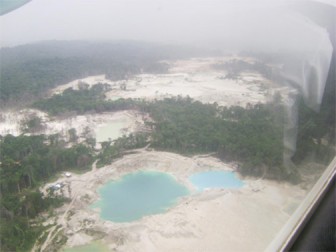The University of Guyana (UG) Faculty of Agriculture and Forestry and Canadian International Development Agency (CIDA) yesterday signed an agreement that will see the management and monitoring of Acacia trees at Mahdia, in Region Eight.
The project, ‘Post-Plantation Management of Acacia on Mined-Out sites at Mahdia,’ is being implemented by UG and funded by CIDA to the tune of over $20M.

The project, which will last for 12 months, is further work on the reforestation activities completed last year by the Faculty of Agriculture and Forestry under the CIDA-funded Guyana Environment Capacity Development Project (Gencapd) Phase 11.
Dean of the Faculty of Agriculture and Forestry Lawrence Lewis, who is also the Project Coordinator, explained that the project started when Gencapd and the Guyana Geology and Mines Commission (GGMC), a partner in the project, conducted the rehabilitation of mined-out sites. He said this work included the planting of over 1,000 Acacia seedlings by four students of the faculty and some GGMC staff, who thereafter monitored the seedlings.
He further stated that the research purpose is the continued monitoring, management and evaluation of the plantation that was established in Mahdia. He also said that the project can be a model that can be replicated at other similar sites in nearby communities.
The objective of this project, Lewis stated, is to improve soil texture and fertility, thereby enabling community residents to reap vegetable crops on the site. He explained that this will require the monitoring of the Acacia in an agro-forestry setting and the use of biomass obtained from pruning to produce bio-char.
Persons who are targeted to benefit from this project are the indigenous and mixed community near the project site, farmers’ groups, women’s groups, school children studying agriculture, youth clubs or groups and also the five people who will be selected to receive training in the production of bio-char and agro-forestry.
Head of Development Cooperation in Guyana and Suriname for CIDA Raymond Drouin explained that this project is building on previous accomplishments by UG and Gencapd. Students, he said, will be engaged in a significant way in the monitoring and management of Acacia plants and will explore the use of bio-char produced from pruning the plants. “Students will seek to introduce the bio-char in the mined-out sites to improve soil texture and fertility, thus enabling residents to eventually grow vegetables crops on the site,” Drouin stated.
He added that CIDA would like to see the university partnering with members of the target communities to better equip them with the necessary skills and knowledge so that they can grow their own vegetable crops which may provide them with an opportunity of becoming involved in a cash crop enterprise.
“The community of Isseneru has taken on a similar initiative and has garnered money from their fish export enterprise to plough back into the development of the community. This is an excellent development model and the university is strategically placed to help make this a reality in the target community,” Drouin noted.
The agreement was signed by Lewis and Drouin. (Frances Abraham)




